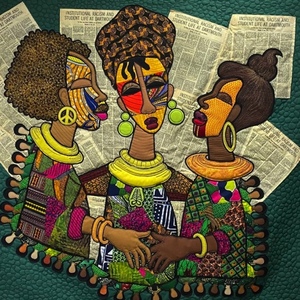A Renewed Responsibility
Wendy Kendrick took the vow she made to never return to Dartmouth following graduation seriously. That is, until May of 2022 when one of her classmates told her that BADA (Black Alumni of Dartmouth Association) wanted to commission her to create an artwork paying tribute to the thirty-eight African American women who had graduated between 1972 and 1976. The individuals leading this commission and communicating with Kendrick were Eileen Cave ’76 and Forrester “Woody” Ashe Lee ’68. Both were aware that she had not returned to campus since graduation.
When asked if she was willing to go back to Dartmouth, she expressed feeling a bad flutter in her stomach. She had mistakenly assumed that she would just create a piece and mail it — anything to avoid stepping foot on campus again. However, she prayed about it and realized that loose ends remained. She had not fully processed and healed from her traumatizing experiences at Dartmouth. She viewed this commission as an opportunity to tie up those loose ends and finally heal. After forty-six years, she returned to Dartmouth.
Kendrick's goal of facing Dartmouth physically and figuratively to heal from her past has allowed her to embark on a new project: remaining present for current Black students. For the past twenty-five years, she has worked with youth as an educator and valued this opportunity to encourage students. Unlike the professor who humiliated her, Kendrick has the self-awareness that she could “never allow those kind of words [that her professor told her] come from [her] mouth towards a student.”
In hearing Kendrick say that she remains committed to becoming more invested in the lives of current Black Dartmouth students, I could not help but recall an oral history interview I saw from the previous class that created digital exhibits. Specifically, Kendrick reminded me of Jelinda Metelus’ interview with Dr. Ronald Copeland ’73, a former president of the Afro-American Society. Metelus described Copeland as “an accomplished alum and inspiring mentor.” This is what Kendrick wants to be for current Black students by making up for lost time due to her separation from the college.
She is providing the support she wishes she had when she was an undergrad. Her story reflects that of a phoenix – rising amidst the humiliation and obstacles thrown at her in pursuing her life’s calling: art.
Wendy Kendrick '76"When I came back, I realized that the responsibility continues. There were [students] before my arrival on that campus who felt the responsibility and made it possible for us to be there, and I just feel that continuation. I feel that responsibility and so, I am making plans to reconnect and find a way that will be viable for me to really help in some form or fashion."
For more information on Eileen Cave ’76, feel free to visit Tamonie Brown's '24 oral history interview with her.
For more information on Dr. Ronald Copeland ’73, feel free to visit Jelinda Meteleus' '22 oral history interview with him.

